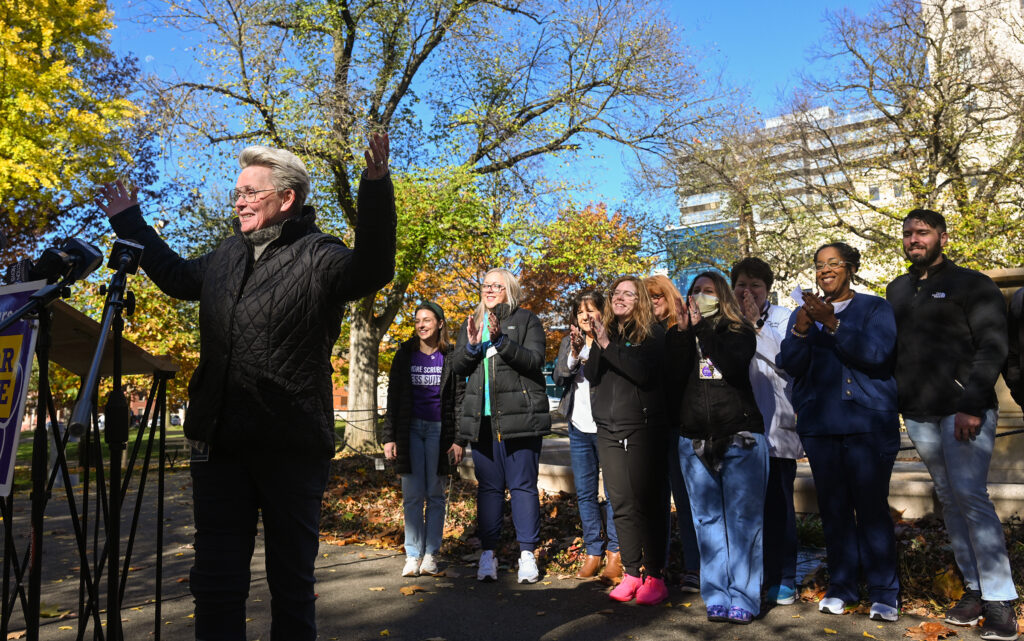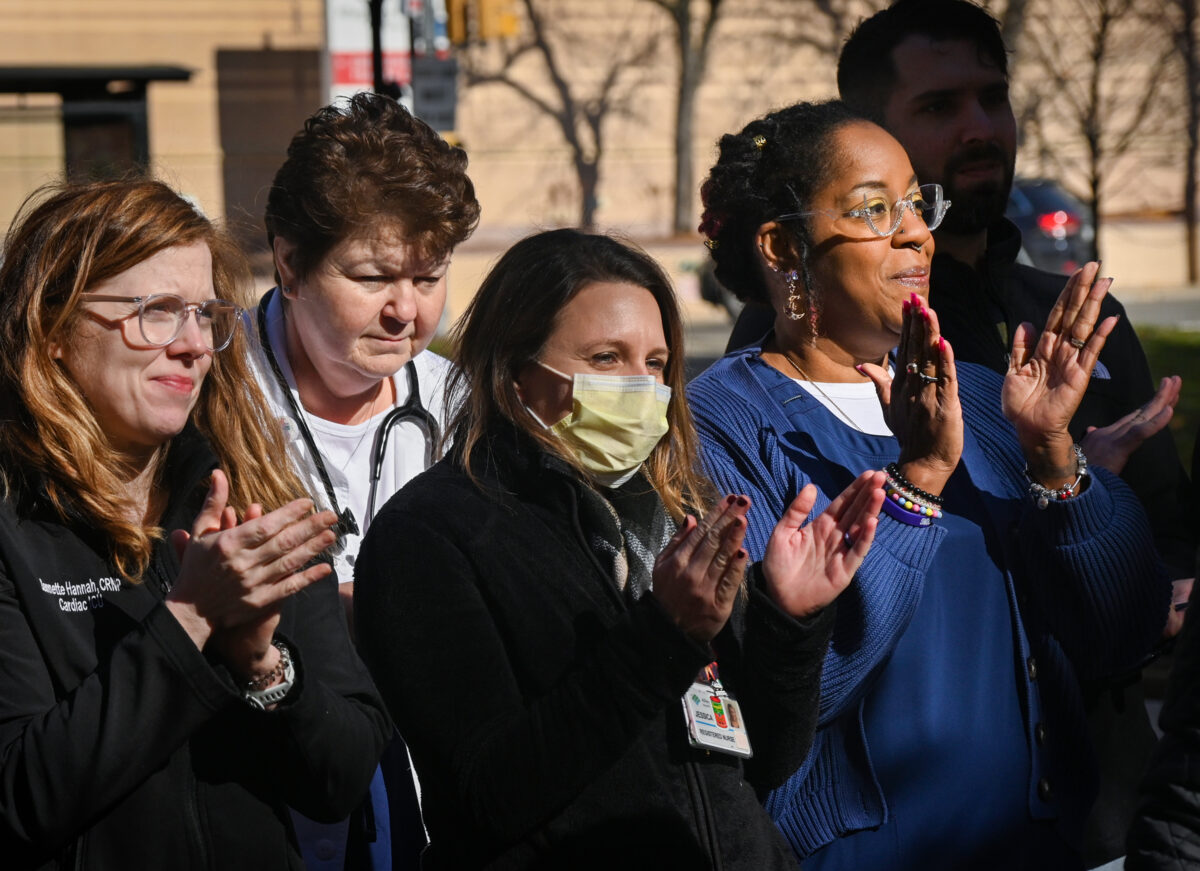Angie Noel stood with her fellow nurses in Friday’s late morning sun to celebrate the ratification of what they’re calling a historic contract with Allegheny General Hospital. The union nurses won an average raise of 23% over the life of the three-year deal, and they’ve got a commitment by the hospital to ease a staffing crisis that nurses say has created exhaustion and burnout.
But coming to an agreement with the hospital wasn’t easy. Noel and other members of her union’s bargaining committee have been negotiating with the hospital since early September. The final push began around 7:30 on Wednesday morning. That session stretched throughout the day. Noel took a break that evening — she got home around 8:30 and slept for three hours. Then she drove back to the North Side to rejoin the bargaining process.
Early on Thursday morning, at the tail end of a marathon session lasting more than 24 hours, the two sides finally finished hammering out the details.
“I’m not an overly religious person,” Noel said, “but I believe I stood up and said, ‘Thank you, Jesus.’ I was so happy and proud that we got it done.”
Her colleagues then voted overwhelmingly to ratify the deal.
On Friday morning, Noel stood behind her fellow bargaining team member Annale Yobbi, an AGH flight nurse, who couldn’t contain her smile as she announced the agreement to a gathering of reporters, supporters and local political leaders.
“We did it, we did it!” said Yobbi, vice president of the nurses’ union.

The wage increase won by AGH nurses, represented by SEIU Healthcare, is more than the 21% recently negotiated by Kaiser Permanente workers in California, who went on strike before reaching an agreement, Yobbi noted. AGH nurses voted to give their bargaining committee authorization to issue a strike notice if a deal was not reached, but a strike wasn’t called.
In addition to the 23% increase, AGH agreed to a starting rate of at least $40 an hour by the contract’s end for all nurses with a bachelor of science in nursing degree.
To reduce the use of agency and travel nurses, the hospital has agreed to hire 70 new per diem pool nurses, who are trained to work in a variety of departments and can fill in where more staff is needed.
“We also improved some of the nurse-to-patient ratios,” Yobbi said. “These are enforceable ratios that no other hospital in Pennsylvania has.”
Nurses have said the past few years have been particularly difficult for them, as the pressures of caring for patients during and after the COVID-19 pandemic created heavy workloads and increased stress, anxiety and burnout. Those pressures did not wane once the pandemic ended, they say. This concern is addressed in the new contract: AGH will lower the copay for mental health visits, which will ease the burden on nurses seeking care.
To improve nurse safety, panic alarms will be installed throughout the hospital by next summer, and additional weapons detection systems will be placed at hospital entrances.
Noel started at AGH in March 2021 and since then has seen “too many nurses burn out and leave.” It made her wonder if she’d made the right decision to become a nurse, she said.
The new contract is a game-changer for her, and she predicts it will be for other nurses, too. She currently earns $31.26 an hour, but in a few years that wage will increase to $40 an hour. “There is not another hospital where I could make $40 an hour,” she said. “We’ll see more and more nurses who will come to Allegheny General Hospital and stay at Allegheny General Hospital.”
Yobbi echoed Noel’s thought.
“AGH is a destination for patient care,” she said. “We need to be a destination for nurses to be employed. And this contract will make us that destination employer.”
Mayor Ed Gainey congratulated the nurses and then voiced his appreciation to hospital negotiators for working with the nurses to come to an agreement.
“It’s extremely important that we have stability in our nurses in this hospital if we’re going to provide the care we know this region desperately needs,” he said. “I want to thank AGH for stepping up and doing just that.”
Like others, he suggested the agreement will apply pressure on other hospitals attempting to retain their nursing staffs.
“We can’t’ get stuck here,” Gainey said. “We need all hospitals to do this.”
Sara Innamorato, a Democrat who’ll face Republican Joe Rockey on Tuesday in a contest to become the next Allegheny County executive, agreed with Gainey.
“Other hospitals need to stand up and take notice,” she said. “This is what solving the staffing crisis looks like, real investment in real local nurses for the long term.”
Noel said she’d never been involved in a union before, and this was her first experience with bargaining. It involved “a lot of hard work, sweat, tears and late nights,” she said. “It was more than I expected, but it’s some of the most rewarding work I’ve done beside being at the beside and taking care of patients.
“The end result was so worth it. I’ve made friends with people that I wouldn’t have met otherwise in the hospital, and those connections are just …,” she said, pausing before finishing. “They’re everything.”
Steve is a photojournalist and writer for the Pittsburgh Post-Gazette, but he is currently on strike and working as a Union Progress co-editor. Reach him at smellon@unionprogress.com.



